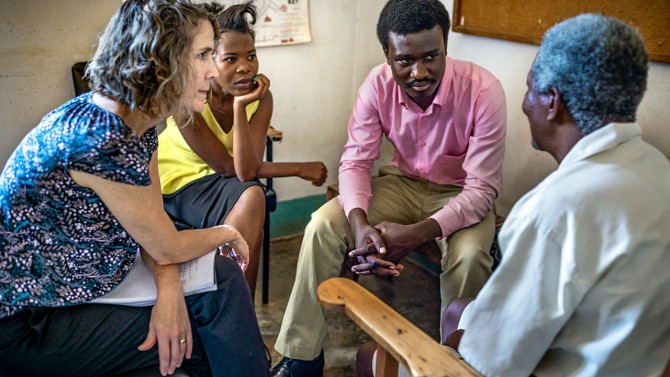
Laurel Hopkins, JD ’19, interviews Malawian Jamu Banda after his release from prison.
Law clinic helped pave way for Malawi’s death penalty ban
By James Dean
Advocacy by the Cornell Center on the Death Penalty Worldwide and International Human Rights Clinic at Cornell Law School helped lay the groundwork for a recent Malawi Supreme Court ruling abolishing capital punishment there.
“The impact of this decision will be felt far and wide,” said Sandra Babcock, clinical professor of law and founder and faculty director of the death penalty center. “The decision further reinforces Africa’s emerging position as a leader in the trend toward abolition of capital punishment.”
Babcock began working on capital cases in Malawi in 2007, the same year its courts ruled mandatory death sentences for capital convictions unconstitutional. At that time, some 170 prisoners serving death sentences became eligible for resentencing hearings.
But it was not until 2015, after the death penalty center and partners including the Malawi Human Rights Commission secured a grant to advance the Malawi Resentencing Project, that hearings began. Over the next several years, nearly 160 inmates – some wrongfully convicted, most receiving competent legal representation for the first time – were released or received reduced sentences.
Students in the International Human Rights Clinic helped achieve those results, working alongside local prosecutors, public defenders and paralegals to interview prisoners about their cases and conduct investigations in rural villages. They helped review files, where available, and write briefs supporting each case. The death penalty center also led trainings for judges, lawyers, paralegals and human rights advocates on how to gather and present mitigating evidence, including the identification and assessment of prisoners with mental illness or intellectual disability. With a grant from The Atlantic Philanthropies, the Cornell Center on the Death Penalty Worldwide recruited psychiatrists who flew to Malawi to train local clinicians in conducting forensic mental health assessments for the sentencing hearings.
To date, the courts have released about 150 former death row prisoners. They included a man who spent 12 years on death row for a crime he didn’t commit, and a woman imprisoned for 11 years after killing her husband while he was in the act of beating her. Some of the prisoners were mentally ill and some were minors when they committed crimes, factors that preclude capital punishment under international human rights law.
“The project has helped ensure that some of the most vulnerable people in Malawian society – prisoners and their families – receive access to the courts and the chance to rejoin their communities,” according to the Cornell Center on the Death Penalty Worldwide’s Africa Appeals Project.
Babcock said the Malawi Supreme Court’s April 28 ruling abolishing capital punishment, which will result in reduced sentences for nearly 40 more death row prisoners, was consistent with the African tradition of Ubuntu, or healing justice.
“Our Malawian colleagues taught us that engaging communities in the resentencing process was critical to ensure that each released prisoner was welcomed back into his or her village,” Babcock said. “Other countries – including the United States – could learn a great deal from this approach.”
In a May 4 press release applauding the Malawi’s abolition of the death penalty, the Malawi Human Rights Commission thanked collaborators on the resentencing project funded by the Tilitonse Foundation. In addition to Cornell Law, they included Malawi’s judiciary, Director of Public Prosecutions and Legal Aid Bureau, the Malawi Law Society, the Paralegal Advisory Services Institute (PASI) and U.K.-based Reprieve.
The successful initiative helped shift opinions about the death penalty, raising advocates’ hopes that abolition might be achievable, Babcock said. A 2018 report by the Cornell Center on the Death Penalty Worldwide and PASI found that most traditional village leaders in the places where released prisoners had returned opposed capital punishment.
“Many noted that rehabilitation is impossible if a prisoner is executed,” the report said.
In 2019, the World Justice Forum in The Hague recognized the Malawi Resentencing Project as a winner of the World Justice Challenge. The Cornell Center on the Death Penalty Worldwide and the International Human Rights Clinic have now expanded their work into neighboring Tanzania and believe the Malawi project could serve as a model elsewhere, including in Kenya, which began a similar resentencing initiative after abolishing a mandatory death penalty.
Muna Ndulo, professor of international and comparative law, called Malawi’s judiciary a model for the region.
“Last year, the judiciary nullified the undemocratic outcome of the previous presidential election,” Ndulo said. “Now, with the abolition of the death penalty, it has established itself as a leader in upholding the rule of law and human rights.”
Babcock said that Malawi’s president, traditional leaders and faith-based communities have embraced the ruling.
“The Malawi Supreme Court’s decision was based on the constitution’s right to life, a principle that is enshrined not only in Malawi’s constitution,” she said, “but in many African constitutions and human rights treaties.”
Media Contact
Get Cornell news delivered right to your inbox.
Subscribe

